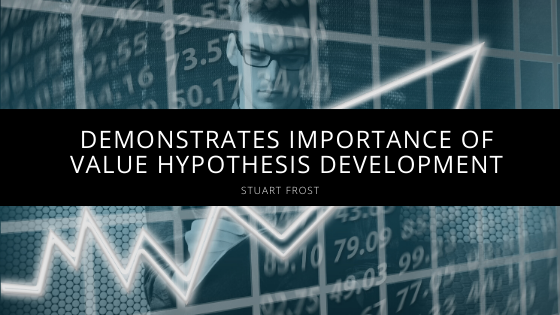Entrepreneur Stuart Frost, from Laguna Niguel, California, reveals how to develop a great value hypothesis and explains why the process is so important.
A great value hypothesis is essential for any business hoping to solve a problem, according to Stuart Frost, a successful technology industry entrepreneur and veteran of the worlds of analytics and data management with more than 30 years of experience. A crucial starting point, particularly for startups, here Frost explains why value hypothesis development is so important when establishing a company’s all-important unique value proposition.
“Developing a great value hypothesis is absolutely essential for any business hoping to clearly communicate to customers why they’re different, better, and worth purchasing from when compared with the competition,” explains Frost.
Two of the most fundamental activities during the early days of any new startup should be the articulation of a testable value hypothesis, and validation of that hypothesis, according to the expert. “With the first two points taken care of, the validated value hypothesis should be used to generate a value proposition with a longevity of at least one or two years,” Frost advises. “From there,” he continues, “a startup can define their minimum viable segment, or MVS, in order to create a minimum viable product, or MVP, to achieve a faster product-to-market fit.”
California-based entrepreneur Stuart Frost believes that developing a great value hypothesis is among the most important first steps essential to success when taking a scientific approach to launching a business. “It’s about recognizing the assumptions that you believe to be true,” he explains, “and testing them vigorously, as early as possible.”
What follows value hypothesis development, according to Frost, should be growth hypothesis development. “While value hypothesis tests whether a product or service truly delivers value to customers, a subsequent growth hypothesis will test whether a business can establish a repeatable and scalable sales cycle moving forward,” suggests the expert.
As a side note, Frost points out that a value hypothesis should not be about whether a business can build a particular piece of technology, for example, but simply about whether it can deliver value to a set of customers.
“Whichever way you look at it, however,” he adds, wrapping up, “a strongly validated value hypothesis should play a crucial part in articulating your final value proposition.”
A veteran of the worlds of analytics and data management with more than 30 years of experience, Stuart Frost, from Laguna Niguel, California, has created and incubated some of the leading companies in the existing IoT and burgeoning IIoT markets, developing an unparalleled knowledge of the key technologies involved in the process.


